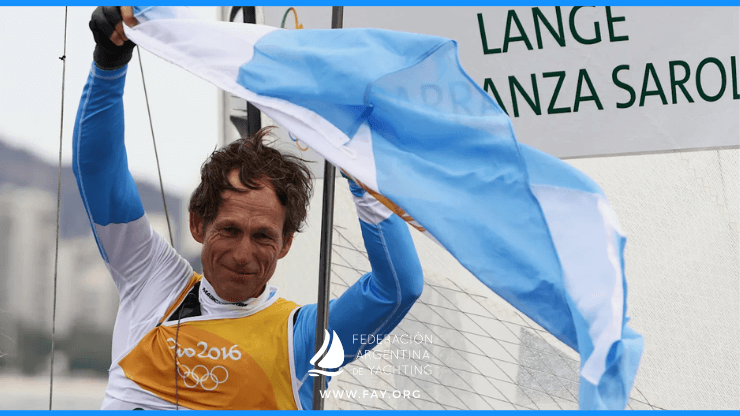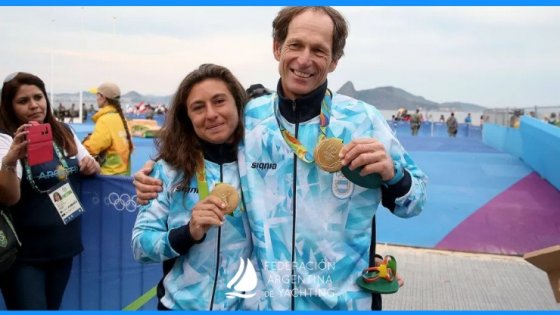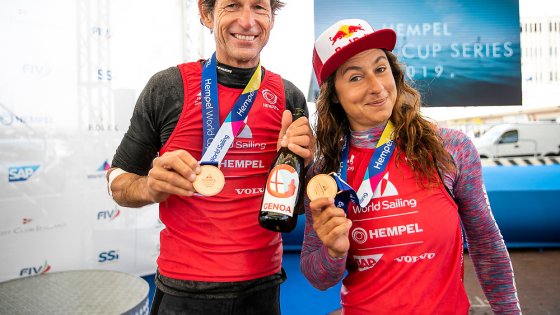By Andy Rice, World Sailing Event Correspondent
For Santiago Lange, the Allianz Sailing World Championships will be his last dance on the Olympic stage. Racing with Vicky Travascio in the Nacra 17 catamaran, the three-time Olympic medallist had hoped to represent Argentina for an eighth time at the Paris 2024 Games.
Coming into this event, the 61-year-old knew his chances of winning the spot for the Games were slim. The Hague is the final of three trial events across the 2023 season, and already their friends and rivals Mateo Majdalani and Eugenia Bosco had stretched a good points lead. At the Semaine Olympic Française in Hyères back in April, Lange was only five days out of the operating theatre after having his appendix removed. It was hardly ideal preparation for the rigours of racing on a frisky, foiling catamaran. “Fortunately only the first day was windy and the rest was light winds,” says Lange. “Where the doctors stitched me up was all good, but the body was using all its energy to repair itself. My brain couldn’t work properly because I was really down on energy. But we managed to complete the regatta which was a big effort, and one we should be proud of.”
Lange was aware that he and Travascio would need to sail a stellar regatta in The Hague while Majdalani and Eugenia Bosco would need an absolute stinker. With two days of Nacra 17 competition remaining their rivals are in 7th overall while Lange and Travascio are in 17th, so the trials are pretty much done. “It’s important for me to sail the best we can, and to enjoy every moment on the water. I’ve been in the Olympic circuit long enough to know how to perform the best in any given situation and I really want to enjoy the fleet and enjoy the opportunity to race these boats.
“It’s a privilege at 61 years old to still be in this class competing at this level. So it would be stupid of me if I let us down and didn’t try so hard because we are not making it to Paris. I am proud for Mateo and Eugenia. Mateo was my coach in Rio [when Lange won Olympic gold with Cecilia Carranza] and that means a lot to me that he’s now in a good position to fight for a medal for Argentina.”
While Lange has competed across many aspects of the sport including the America’s Cup, the Olympic spirit courses through his veins. He campaigned in the 470 for Moscow 1980 and Los Angeles 1984, although it wasn’t until 1988 that he managed to win the qualification spot for Seoul. He has since competed in every edition of the Games except for London 2012.
Lange won successive bronze medals at Athens 2004 and Beijing 2008, but his crowning glory came at Rio 2016 when he and Carranza won a last-gasp gold in a nail-biting Nacra 17 medal race. Aged 54, he was double the age of many of his fellow competitors and was only a year past a life-threatening bout of cancer which resulted in half of one lung being removed.
The game has changed a lot over the past 40 years of Olympic campaigning. “Coming from Argentina, it was kind of an impossible dream going to the Olympics back in the 1980s. Mostly we campaigned at home and trained and raced against the other guys back home. International competition was much more limited.”
The circuit has also become more professional, more expensive, and the boats are much faster. Lange is very keen to see costs reduced on the Olympic tour which is becoming very hard for sailors from poorer nations. He was also resistant to the number of technical upgrades that the Nacra 17 has experienced over the past decade, although he admits he loves the boat in its current form, capable of foiling above the water at high speeds both downwind and upwind.
“I love the Nacra, it’s the hardest boat I’ve ever sailed. The foiling is so demanding. The higher you go above the water, the faster you go, but the bigger risk you have to ventilate and drop down and crash. You can lose five boat lengths in one go. So there is a lot of pressure to sail the boat properly at all times, to really focus. But of course you still need to look around and see what’s going on, so there has to be so much coordination between helm and crew. It’s so intense, I love it. And I will miss it.” His many friends in the Nacra 17 fleet, the whole Olympic sailing family, will miss him too.




